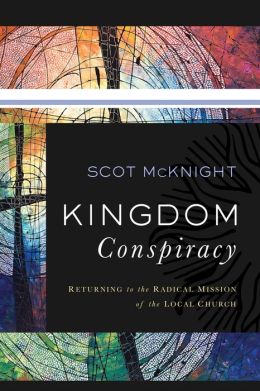 Jonathan Merritt interviews Scot McKnight on his new book, Kingdom Conspiracy: Returning to the Radical Mission of the Local Church. I have not yet read Scot's book, but I will do so within the next few weeks. I have already had several discussions with Scot on the subject and know that his views on church and kingdom are congenial with mine. In the interview Scot states,
Jonathan Merritt interviews Scot McKnight on his new book, Kingdom Conspiracy: Returning to the Radical Mission of the Local Church. I have not yet read Scot's book, but I will do so within the next few weeks. I have already had several discussions with Scot on the subject and know that his views on church and kingdom are congenial with mine. In the interview Scot states,Open your Bible and you will see throughout the Old Testament and into the New, and then skip around in the Jewish sources like Josephus and you will see that the natural equivalent for "kingdom" is "nation." That is, kingdom is a people under a governing and saving king. That people is Israel and the church.
Here's what matters: hordes of American Christians are far less committed to their local church because they are committed to doing "kingdom work." Kingdom for many means the bigger things God is doing in this world. A proper kingdom theology leads people to the middle of the church, not away from it. So it makes a difference when church is on the decline and people are saying they are committed to the kingdom but not so much to the church. You can't have kingdom without church.
Scot is spot on. The kingdom cannot be separated from the king, which also means the kingdom cannot be separated from the church, the Body of Christ.
What God has joined together, let no one put asunder.
___
The entire interview can be read here.
2 comments:
I think one of the issues is that the pastors of many denominational churches and also independent churches over emphasize how important the differences are between their church and other churches. At times the pastors may have a point, but often an over zealous attempt to differentiate churches theologically from each other tends to undermine the message that "this specific church is important." When pastors begin to equate the kingdom of God with the local church they face the issue that they have often already undermined their credibility by exaggerating how their church is superior to other churches.
Danny,
That's an excellent point. If churches were less provincial in reference to other churches and did more partnership with one another in ministry, then the connection between church and kingdom would become more clear, I would think, in people's minds.
Post a Comment